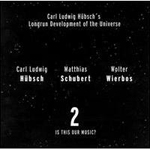|
|
 |
Dusted Reviews
Artist: Carl Ludwig Hübsch Album: Is This Our Music? Label: Konnex Review date: May. 3, 2006 |

|
|
|
 |
A reaction to the heavy declaration of Ornette Coleman’s 1960 This is Our Music, the second album from Carl Ludwig Hübsch’s trio Longrun Development of the Universe uses Coleman’s statement as a jumping-off point for an exercise in Hübsch’s personal compositional style. On the disc, Hübsch explores what he personally believes to be the heart of jazz music; namely, the place where composition and improvisation meet, and the interplay between the two. Unlike reactions by many of Hübsch’s forefathers and contemporaries to this question, he doesn’t simply aim to meld the two into a fluid, abstract, but always intentioned whole. Instead, he creates a path of music that his compatriots can enter or exit freely, a thoroughfare of composition with improvised byways on either side.
On the trip with Hübsch and his tuba are Mattias Schubert (saxophone) and Wolter Wierbos (trombone). Wierbos, as part of the Dutch jazz tradition, and as a member of the ICP Orchestra, has experience in the interchange between composition and improv. Hübsch and Schubert may not be as familiar to many listeners, but they’re no less able as members of Longrun Development of the Universe, a trio which, even in its most fragmented phases, places more importance on group cooperation that individual acrobatics. In each piece, a theme is stated and manipulated, with the trio playing more or less in unison to start, but slowly departing from the composed path. The pieces become increasingly fluid, with the participants’ excursions moving more and more abstractly away from the piece’s backbone. At times, the extracurricular exercises dance tantalizingly close to the compositional flow, at others a track disassociates itself completely from its former route, with the three abandoning completely the preordained path. It’s worth noting, however, that Hübsch, Schubert and Wierbos don’t strain to disassociate themselves completely from one another, or from the course they’ve formerly tread. Often, they’re happy enough to smear and slur a melody like buzzed bar-goers, communicating in a more obscured manner but still getting their point across. The timbres of the sax, trombone and tuba create some interesting sonorities, especially in a decidedly jaunty piece, or when Hübsch and Wierbos depart on similar paths, leaving Schubert alone amidst a series of robust and brassy interpolations.
On “NGC 2274 Akkord,” one can hear what might be vocal cues, and there seem to be understood signals of transition within Is This Our Music?. But whether Hübsch composed each piece with such indicators in place, or whether they were a more organic result of the time spent cooperatively honing the album, Longrun Development of the Universe are capable of moving from scattered, disparate detours to a uniform declaration speedily and with ease. Hübsch’s exploration of composition and improvisation works to both blur the line between the two and sandwich them in adjacent contrast. While his query doesn’t carry the authoritative hardiness of Coleman’s original assertion – musically or linguistically – when the trio’s bouncing trajectories come together for the conclusion of “Al Kaphra,” it’s a worthy example of why the answer to Hübsch’s question is definitely in the affirmative.
By Adam Strohm
|







